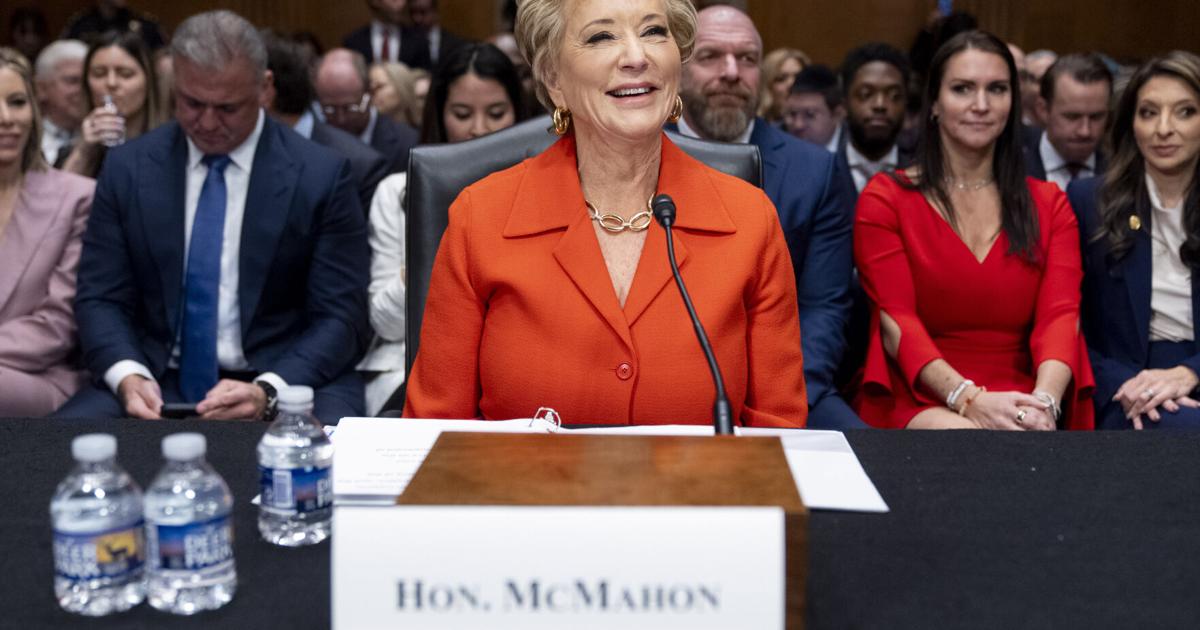The Trump administration is giving states 10 days to certify that schools are not engaged in what it considers illegal practices related to diversity, equity and inclusion — an order that could potentially threaten funding for some Louisiana schools.
In a letter Thursday, the Department of Education said state education agencies and school districts must affirm in writing that schools are complying with anti-discrimination laws. Programs that promote diversity, equity and inclusion, or DEI, by favoring students of one race over another violate federal law and could lead to a loss of federal funding or other sanctions, the department said.
“The continued use of illegal DEI practices may subject the individual or entity using such practices to serious consequences,” said the certification form that state agencies and school districts must sign.
The directive is the latest attack on diversity efforts at colleges and K-12 schools, which the Trump administration says have discriminated against White and Asian students by seeking to support other students and employees of color. The administration already has targeted DEI programs in education, launching investigations into universities — including Tulane — that partnered with a group that helps Black and Hispanic students earn doctorates, and cancelling federal grants for programs that aim to increase teacher diversity.
Any disruption in federal funding would be disastrous for Louisiana schools, which get nearly 20% of their money from the federal government. Thursday’s letter specifically threatens Title I funding, which supports schools with large shares of students from low-income families. Louisiana schools got about $395 million in Title I dollars last fiscal year.
The Trump administration’s DEI crackdown is based on the controversial argument that any program that considers students’ race violates Title VI of the Civil Rights Act and Students for Fair Admissions v. Harvard, the U.S. Supreme Court decision that restricted the use of race in college admissions. In a Feb. 14 memo, the U.S. Education Department said that “treating students differently on the basis of race to achieve nebulous goals such as diversity, racial balancing, social justice, or equity is illegal under controlling Supreme Court precedent.”
Louisiana Superintendent of Education Cade Brumley has endorsed this reading of federal law.
In a Feb. 19 letter to school districts, Brumley said his agency agrees with the federal guidance and advised schools to review their practices. He added that his agency is working to keep “inherently divisive concepts” such as DEI out of Louisiana schools.
Louisiana’s Education Department also has created its own certification letter that school districts will have to sign to receive federal funding that the state distributes, according to a copy of the letter provided by the department. The letter will ask districts to affirm “the absence of DEI programs that treat students differently based on race, engage in racial stereotyping, or create hostile environments for students of particular races.”
The federal guidance — and Brumley’s vow to strictly enforce it — could put some Louisiana schools in the crosshairs.
Under a 2024 state law, schools had to report any programs related to diversity, equity, inclusion and belonging that were in place between 2021 and 2024. Schools reported hundreds of activities, including Black History Month and Hispanic Heritage Month celebrations, multicultural and gay-straight alliance clubs and anti-racism trainings for school staffers. Other schools reported staff trainings on “culturally responsive” practices and lessons for students on “social-emotional learning.”
It’s not clear which, if any, of those programs are ongoing. And the Trump administration has not clearly defined what it considers “illegal DEI practices.”
But some of the programs could run afoul of federal guidelines. A U.S. Education Department document says that some schools “have sought to veil discriminatory policies with terms like ‘social-emotional learning’ or ‘culturally responsive’ teaching.” It also says schools must consider whether a Black History Month celebration or similar program “discourages members of all races from attending” or creates “hostile environments based on race for students who do participate.”
Even before Trump returned to office this year, Louisiana Republicans had gone after school programs related to race. Last year, Gov. Jeff Landry, who’s closely aligned with Trump, issued an executive order restricting what schools can teach about racism.
Amid the heightened scrutiny, some schools have ended programs that could be labeled as DEI.
FirstLine Schools, which operates several New Orleans charter schools, last year reported to the state that it had spent about $538,000 on an annual anti-racism training for new staff and a chief equity officer.
On Thursday, FirstLine CEO Sabrina Pence said the organization no longer has a chief equity officer and does not plan to continue the training. She attributed the change to the school’s compliance with the law and “evolving state and federal expectations,” adding that the efforts were paid for entirely with private funding.
Caroline Roemer, chief of the Louisiana Association of Public Charter Schools, said schools are seeking clarity about the Trump administration’s latest DEI order. She added that school leaders want to ensure that they don’t lose any much-needed federal funds.
“These are complicated times for our schools,” she said, citing federal policy changes under President Trump. “We’re doing our best to navigate that change and continue to advocate for the needs of our students.”







